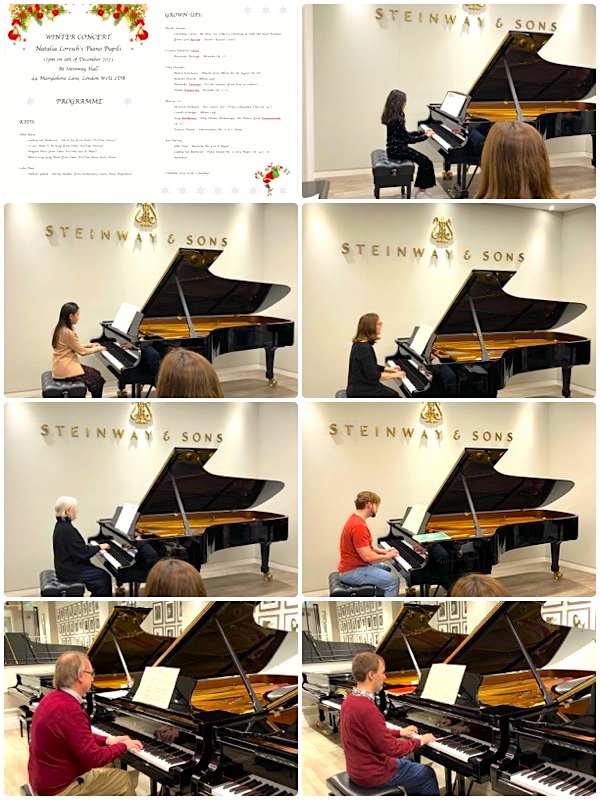Piano Lessons for Beginners of All Ages
In the last 18 years of teaching masses of complete beginners started their piano studies here and many progressed to an advanced level passing exams, winning prizes in competitions and performing publicly. Many others developed a passion for music by learning to play piano and understand music in context without the explicit intention to take exams or expose themselves publicly in any kind of pianistic terms.
There are lessons plans for pupils with particular goals and also for pupils who come to acquire the skills for an engrossing incredible hobby which can bring happiness, joy and healing and be shared with others.
📖 "A fiery, good beginner always stands higher than a master in mediocrity."
Robert Schumann
From the latest Piano Pupils' Concert at Steinway Hall London:
Beginning Piano Students will:
🎵 Start learning with a performing musician and a fully professional, qualified and experienced teacher without accumulating bad habits and dysfunctional techniques. As Felix Le Couppey, the famous French piano professor, wrote, "It is believed, and it is a prejudice unfortunately too widely diffused, that in laying the foundation of a musical education, a second-rate teacher and a poor instrument will answer all purposes. I cannot too strongly express my disapproval of an opinion so opposed to the rules of common sense. Far from being of no consequence, the first lessons, on the contrary, exercise a very direct action on the pupil's future, and their influence is long felt. Often, several years hardly suffice to correct faults contracted during a few months, and more than one talent has gone to ruin from having been badly directed at the outset."
🎵 Develop into independently thinking pupils and functioning pianists or piano amateurs with a life-long passion for music.
🎵 Be encouraged to enjoy embarking on a musical discovery tour through books, recordings, concerts, videos etc to explore the versatile richness of the Western cultural heritage.
🎵 Play music with a spark.
🎵 Learn to listen to music in an informed way.
🎵 Learn to read music efficiently and learn new pieces quickly and autonomously. As one of Britain's most important music educators Alec Rowley wrote, "to be able to read well at sight should be the object and aim of all those who study music. It widens the horizon and enables the player to grasp more quickly every new work he meets with and studies. The whole world of music lies open before him. The poor sight-reader is only able to play the few pieces he has studied by slow degrees and more or less mechanically. Sight-reading teaches the player to think ahead and quickens his perception and anticipation, making him alert and alive."
Alec Rowley Practical Musicianship (1941)
🎵 Acquire a theoretical basis and aural skills.
🎵 Learn to play accurately as a consequence of mental clarity. This is an essential component in beginners' tuition and a good habit which is really necessary in any kind of performances at all levels.
🎵 Build up a functional technical foundation systematically and learn to solve technical problems. As Sergei Rachmaninov (one the greatest composers and pianists of the 20th century with a phenomenal technique) wrote in 1917, "Personally, I believe this matter of insisting upon a thorough technical knowledge is a very vital one. The mere ability to play a few pieces does not constitute musical proficiency. It is like those music boxes which possess only a few tunes, The student's technical grasp should be all-embracing."
In James Francis Cooke's Great Pianists on Piano Playing
🎵 Learn to pedal.
🎵 Consciously learn to play with a beautiful tone without unnecessary hammering from the very beginning.
🎵 Learn to have a healthy posture and if necessary to develop an individual plan for physical exercises.
🎵 Learn to be free from tension.
🎵 Learn to prevent problems from developing.
🎵 Learn to begin to build up a repertoire.
🎵 Learn to develop a rich and varied sound.
🎵 Learn to play with and without arm weight depending on repertoire.
🎵 Learn to memorise music (if relevant in individual context). The value of memorisation consists not only in mental discipline and the analytic approach which brings a much more detailed grasp of a piece as well as deeper understanding through deepened study but also physical/musical benefits which free the player from the necessity of constantly having to follow the score. Furthermore, memorisation allows the player to perform a piece spontaneously whenever asked in social contexts without having to carry the music everywhere; the value of sharing the joy of music with friends cannot be underestimated.
🎵 Learn to understand the musical language and interpret its meanings.
🎵 Learn to incorporate harmonic and formal analysis into interpretation.
🎵 Learn to plan their practice effectively and avoid practising senselessly and aimlessly. As the famous French piano pedagogue and composer of many pieces for beginning as well as advanced learners wrote, "everything lies in knowing how to practics." (Felix Le Couppey Piano Teaching. Advice to Pupils and Young Teachers)
🎵 Learn to set realistic goals and realise them.
🎵 Develop a confident way of playing and build up overall confidence as well as self-belief.
🎵 Lay a basic foundation to develop performance skills through various performance opportunities.
🎵 Learn to prepare for exams, festivals, competitions, school concerts/assemblies or any kinds of performance events.
🎵 Learn to get distinctions in grade examinations and top prizes in competitions.
🎵 Learn to approach the masterpieces of the art of music.
🎵 Learn with a practising pianist and hear professional demonstrations of repertoire studied in lessons. Pupils learn much faster and much more efficiently when they see/hear that and how the seemingly unsurmountable difficulties of new steps and challenges can be easily dealt with. Complementing verbal explanations with actual playing not only speeds up progress but also gives pupils performance and artistic skills which cannot be acquired through words only.
🎵 Be welcome to participate in Piano Hours which provide a friendly non-competitive non-public performance environment in which pupils not only play themselves but also learn to formulate constructive critical feedback to help others; pupils often make friends with each other and tea/coffee/cake are always provided.
🎵 Have access to a lending library.
Please read the Ethos & Values page for an overall description.
Josef Lhevinne, the great pianist and leading piano professor whose teaching established the international importance and quality of the piano department at the Julliard School, wrote in 1924 on "a good foundation in real musicianship" which is "the most important thing. … Certain things cannot be skipped in the early lessons without appearing to the enormous disadvantage of the student in later years. Possibly here is the greatest waste of music teaching, poor or careless instruction in the earlier years. The teacher of beginners is a person of great importance in all education, particularly in music. … The folly of paying a teacher a considerable fee for instruction that should have been given at the very beginning, is too obvious to comment upon." (Basic Principles of Pianoforte Playing)
Requirements for Starting Piano Lessons as a Beginner:
🎵 Pupils' own interest in music (and in this case particularly in learning piano) and willingness to practise.
🎵 (For children only): Very basic ability to count (at least up to ten with addition / subtraction) and read/write letters (at least the first seven letters of the alphabet).
🎵 The orientation here is 100% results; the aiming-at-the-minimum-quality (pass mark) approach with three pieces per grade is not ideal; switching from the latter to the former takes time because it involves a redevelopment of skills at any level.
🎵 Willingness to behave appropriately and be civilised without using vulgar language or acting in questionable ways is an absolute must. Please check the Teaching Ethos page for further details.
📖 "Patience and exactitude are the main conditions for success…" Marie Prentner Leschetizky's Fundamental Principles of Piano Technique
Book a Consultation Piano Lesson
Get in touch with a request by calling, sending a message or emailing:
☎️ +44 (0) 7454766539
📮 contact@pianolessons-london.co.uk
Beginner Pupils Play in Piano Lessons:
Ruimin at Steinway Hall, London
Piano Grade 1
Hita at Music Studios, London Marylebone
Gedicke, Piano Grade 1
Vincent at Bluthner Piano Centre, London Mayfair
Gedicke, Piano Grade 1
Vincent at Bluthner Piano Centre, London Mayfair
Le Couppey, Piano Grade 1
👉 Find many more pupils' recordings on the Media Pages
Book a Consultation Piano Lesson
Get in touch with a request by calling, sending a message or emailing:
☎️ +44 (0) 7454766539
📮 contact@pianolessons-london.co.uk
Piano Lessons London | Online Piano Lessons | Piano Teacher Bio | About Lessons | Piano Lessons for Beginners | Advanced Piano Lessons | Piano Lessons for Kids | Piano Lessons for Adults | Locations | Fees & Discounts | Results | Ethos | Music Library | FAQ | Performance | Piano Hours | Teaching Schedule | News | Media | Links | Reviews | Policy | Blog | Materials | Contact
 Piano Lessons in London & Online | Natalia Loresch | Beginners | Advanced | Professionals ☎️+44(0)7454766539
Piano Lessons in London & Online | Natalia Loresch | Beginners | Advanced | Professionals ☎️+44(0)7454766539